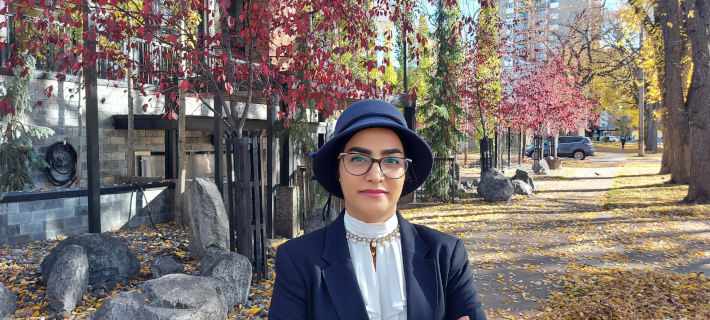Iranian legal scholar thrives in foreign-trained lawyer program
Helen Metella - 30 November 2021

From university lecturer in Tehran to articling student in Edmonton, Macy (Masoume) Mirmohamadi Mirsane’s journey is a study in how perseverance and optimism can overcome serious roadblocks.
The 2021 student of the Internationally Trained Lawyer Pathway at the University of Alberta Faculty of Law left the impressive career she was building as a young legal scholar in Iran to emigrate to Canada in early-2020.
Her departure was motivated by first-hand knowledge that women’s rights are not sufficiently respected in her native country and that even as a faculty member at a prominent law school, she would continue to be pressured to adjust her attitudes and beliefs.
She already had a PhD in public international law, was interested in interdisciplinary research and was a rising expert in the field of international genetics law, with emphasis on international legal dimensions of biotechnology.
“It’s a new field of study,” she says. Despite Iran being rich in genetic resources, she says the country had relatively little understanding of the legal issues surrounding the collecting of genetic materials for industry, agriculture, medicine and pharmacology.
Her PhD thesis examined both the accumulation of genetic resources and legalities that spanned the field, from labelling GMOs and consumers’ rights to human rights and environmental rights.
From that work she published two books and continues to be sought after as a referee for academic articles in the field.
Additionally, she worked as a lawyer and legal advisor in Iran’s presidential office.
Starting At Zero
As an immigrant to Canada, however, she had to start again. “At zero, or maybe under zero,” she says.
Discovering that getting her accreditation to be a lawyer in Canada was possible by taking the one-year program Internationally Trained Lawyer Pathway was a huge relief to Mirsane.
“It revived your hope as an immigrant,” she says. “It really motivated me, knowing that I didn't need to go through a whole three-year law program (beginning with the LSAT).”
During the one-year program, Mirsane took the same classes that other JD students in years 1L to 3L did — although the COVID-19 pandemic’s restrictions in 2020-2021 meant she attended virtually.
Alberta Law Review
Nonetheless, she had a strong connection to her professors, one of whom encouraged her to expand a class assignment on professional responsibility. Mirsane turned an assigned 15 to 20- page paper into a 40-page article. Titled, “The Roles of Amicus Curiae (Friend of the Court) in Judicial Systems With Emphasis on Canada and Alberta,” it will be published in Volume 59, issue 3 of the Alberta Law Review, in spring of 2022.
By successfully completing her Canadian law studies through the U of A’s program for foreign-trained lawyers, she met the requirements of the Federation of Law Societies of Canada’s National Committee on Accreditation without having to write the NCA examinations.
Mirsane says the support of the Faculty’s ITLP coordinator and student wellness contact was invaluable, especially when Mirsane’s father suffered a stroke at the beginning of her studies, and she was unable to travel to Iran to see him. She appreciated her husband’s sympathy and cooperation during this tough time.
Having the same access to Career Services as regular JD students was also a vital bonus. “We had mock interviews, we talked about the style of interviews and resumes in Canada, and they were always sending (weekly) newsletters with job openings,” says Mirsane. “It was very supportive.”
While studying, she worked part time as a researcher and contract reviewer for Evan Project Service Inc.
After graduating from the U of A’s program in spring of 2021, she started the PREP program (the Canadian Centre for Professional Legal Education’s Practice Readiness Education Program) and obtained an articling position with Masuch Law which she began in October 2021.
Completing the U of A’s foreign-trained lawyer’s course via virtual studies certainly strengthened her communications online, says Mirsane. But most of all, the program “taught me that I can still adapt to hard situations, to challenging situations. I can face more difficult situations than I thought.”